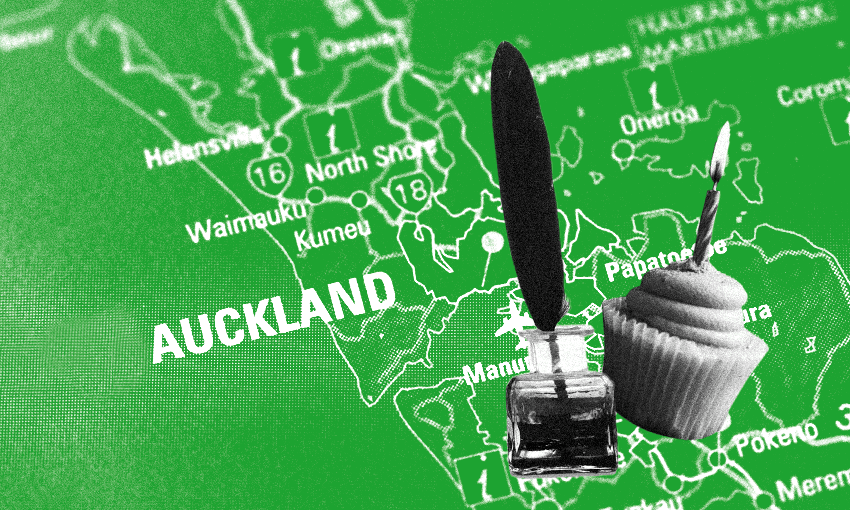Ngāti Whātua Ōrākei want to initiate a conversation about changing Auckland’s anniversary to a locally relevant date.
As the sunrise peaked over the waters of te Waitematā on a windy, misty morning, a karanga warmed the cold air atop Maungawhau. Lines of traffic formed on Auckland’s roads below at the same time as lines of whakapapa were acknowledged. On the morning of September 18 2023, Ngāti Whātua o Ōrākei visited Maungawhau (Mount Eden), the Ōpoutūteka waterway (Cox’s Creek, Herne Bay), the slopes of Taurarua (Judges Bay, Parnell) and te Rerenga Oraiti (Point Britomart, Emily Place) for a special commemoration. Today’s proceedings were familiar to some, as last year a similar haerenga was run for this same kaupapa.
Why all the fuss on a day most super city residents would think is just ordinary? Each year, the Auckland anniversary public holiday falls on the Monday closest to January 29. Yet that date – which commemorates William Hobson arriving in Pēwhairangi, Te Tai Tokerau in 1840 – has little relevance to Tāmaki Makaurau. Auckland’s anniversary memorialises the founding of the country-at-large, not the founding of Auckland City nor the day the city became New Zealand’s second capital or its largest metropolis.
Although Auckland’s anniversary is officially in January, Ngāti Whātua o Ōrākei (hereafter Ngāti Whātua) argue the city was born in September 1840. September 18, 1840 was when their paramount rangatira Āpihai Te Kawau – on behalf of the iwi – laid the foundations for Auckland City. A mokopuna of Te Kawau and the current chair of Ngāti Whātua Ōrākei Trust, Marama Royal, says September 18 “is the true birth of this beautiful city we call home”.
Ngāti Whātua kōrero tuku iho remembers September 18, 1840 as when Te Kawau stood atop Maungawhau and mapped out where Hobson would be invited to establish a city. Auckland’s original site was a 3,000-acre block that extended from its southern point at Maungawhau to Ōpoutūteka in the west and Taurarua in the east. Without the 3,000-acre block, the contemporary city wouldn’t exist, explained deputy mayor Desley Simpson – and Royal added that the manaaki of her tūpuna enabled the flourishing modern city.
The block gave settlers a foothold of fertile, volcanic soils adjacent to plentiful moana. To mark the occasion, Crown officials, settlers and tāngata whenua gathered at Te Rerenga Oraiti for a 21-gun salute and raising of the Union Jack. At the same time, Ngāti Whātua waka and imperial ships rode across te Waitematā side-by-side.
However, Ngāti Whātua maintain that their tūpuna did not “sell” the whenua to the Crown. To historic Māori, buying, selling and private property were literally foreign concepts. But this whenua wasn’t merely a “gift” for settlers to screw around with either. Ngāti Whātua historian Joe Pihema wrote on The Spinoff that the block “was known as a Tuku Whenua and was not meant as a gift or sale of land, but an enduring bond between Ngāti Whātua and the Crown, an obligation and responsibility to support and embrace each other as partners and friends.”
Yet the Crown has not always lived up to the agreement laid out on September 18, 1840 (nor the Treaty signed on February 6, 1840). This morning, Pihema admited, “After 1840, there was a concerted effort by the government and settlers to relieve Ngāti Whātua of our lands.” He noted that the Crown and tauiwi-at-large benefitted from the immense sacrifices his iwi made.
The overwhelming majority of Ngāti Whātua whenua was stolen – the iwi being reduced at one point to only their Ōrākei block and a papakainga at the nearby Ōkahu Bay. But in 1952, the Crown destroyed the Ōkahu papakainga because they considered it “a dreadful eyesore and potential disease centre” along a tour route Queen Elizabeth was set to take. A quarter of a century later, the iwi had to occupy Takaparawhau for 506 days to stop further whenua theft.
Despite the Crown’s betrayal of their original agreement with Ngāti Whātua, the iwi is moving forward, not focusing on past transgressions. “If Āpihai were alive today, he’d be happy that his people have been able to move forward with strength and confidence,” said Pihema. He explained that as part of the haerenga of moving forward, “it is crucial that we have the conversation about changing the anniversary date from January to September.”
The city should have an anniversary date relevant to its origin, unique identity, sense of belonging and place, argued Pihema. In his 2022 Spinoff article, he explained September 18 “is a day that allows us to recognise some of our shared ancestors, Pākehā and Māori, who came together 182 years ago to lay the foundation that allowed this city to grow.” Pihema saw this kaupapa as an opportunity to empower Auckland residents by learning their city’s history.
This morning, when the media asked deputy mayor Simpson why the city’s anniversary is January 29, she incorrectly suggested it was the date Auckland became New Zealand’s capital. Mentioning that is not a personal slight on Simpson, but an indication about how little of our history is common knowledge. Much like Pihema, Simpson hopes that more Tāmaki Makaurau residents learn local history after today’s kōrero. Ngāti Whātua o Ōrākei is keen to help with that, including Royal, who said: “To the people of Auckland, the people of Tāmaki Makaurau – if you want to know our stories, nau mai, haere mai. Come to our marae. Our door is always open.”
This is Public Interest Journalism funded through NZ On Air.
